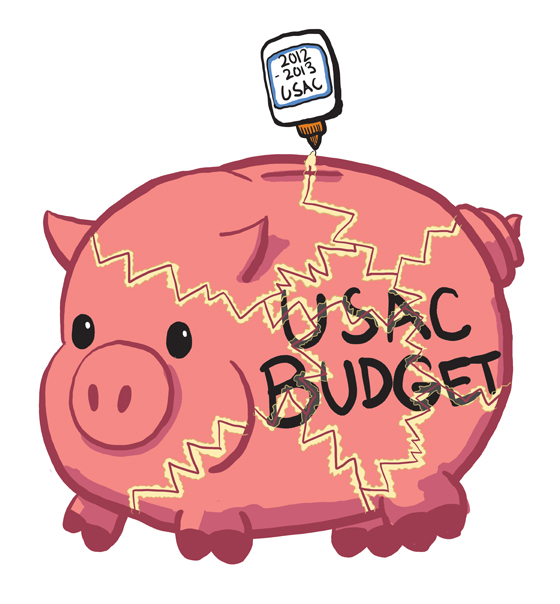Correction: The updated version of this column contained an error. Cultural Affairs Commissioner Kinnery Shah was successful in continuing Hip Hop Appreciation Month this year. Campus Events Commissioner Daniel Soto was unable to collaborate on the event despite initially aiming to.
That all but three offices will go uncontested is not the only unique facet of the upcoming Undergraduate Students Association Council election. This year’s contest is taking place in a condition of funding scarcity that may seem like familiar territory for a country steeped in recession, but is new ground for UCLA’s student government.
On Monday, the USAC candidates will release their platforms for the student body to scrutinize. In light of the bleak financial landscape that has taken shape over the past school year, the student body must elect a council that endorses a philosophy of frugality and resourcefulness.
Every year, the council neglects to spend a certain amount of its operating budget, generating a chronic surplus that ticked upward from about $200,000 in the 2006-2007 fiscal year to a little more than $500,000 available to last year’s council.
This year, the number dropped back to $248,857, said Roy Champawat, director of Ackerman Student Union. The resulting shortfall requires that students look at candidate platforms with a realistic attitude favoring the pragmatic over the fanciful.
Before the shortfall, USAC had been spending liberally, as if it were set to receive the half a million dollars it got the previous year. In a fit of imagined prosperity, USAC spent about $20,000 on homecoming and a roughly equivalent amount on textbook scholarships. When the numbers came in below expectations, the council took drastic measures, including a 50 percent cut to the amount allotted to student organizations through the contingency fund, a discretionary pot overseen by the council, said Patty Zimmerman, Associated Students UCLA student support services manager.
The deficit between the expected surplus and the actual sum seems to have thrown a wrench into the ambitious plans of several USAC offices. Programs that fell by the budgetary wayside include Financial Supports Commissioner Andrea Hester’s plan for a parking scholarship for students and Campus Events Commissioner Daniel Soto’s plan to collaborate with other USAC offices on events such as Hip Hop Appreciation Month.
“The biggest inhibitor to what our offices wanted to do this year was funding,” said David Bocarsly, USAC general representative and this year’s uncontested candidate for president. “Not all services that we provide cost money, but a lot of them do come out of student fees.”
The moral of the story is that the electorate would be well-served to adopt realistic expectations of what USAC candidates can deliver. The perennial promise of being able to use meal swipes on campus is less likely to come to bear in this year’s climate than ever before.
Empty promises such as meal swipes on campus fall well outside of USAC’s sphere of influence. Rather than failing for financial reasons, these programs die in infancy because they lack institutional realism. For example, General Representative Daniel Chikanov’s promise of a UCLA-Westwood bike path was dubious, as it reached outside of USAC’s capabilities. Academic Affairs Commissioner Raquel Saxe’s promise to save Covel Peer Learning Labs was equally unfeasible; instead she managed to make the same resources available elsewhere on campus when Covel was cut. In good faith, her campaign should have promised to compensate for Covel, rather than save it, as the latter is beyond her office’s control.
In addition to watching out for platforms that seem financially ostentatious, students should be wary of any campaign that deals with issues beyond USAC’s scope.
Bocarsly said that a largely uncontested election cycle will make for more realistic platforms by toning down the level of competition. But students must nonetheless look to the contested races with a discerning eye. In the race for Financial Supports commissioner, for example, practicality and candor will be of particular importance.
Both candidates, Sahil Seth of Bruins United and Taylor Bazley, an independent, said they will seek to expand USAC’s revenue generation and provide students with personal financial tools.
When they release their platforms on Monday, the student body will be able to get a look at the specifics of their proposals; whichever candidate provides the most efficient, down-to-earth schematic of how to accomplish their goals should receive the students’ votes.
Budget surpluses tend to vary over time, following a cyclical pattern, Champawat said. Next year, the number may come in above expectations, leaving USAC with a sudden influx of unexpected cash. Regardless, it is expedient for USAC to treat a surplus like a surplus, spending frugally until it is reasonable to do otherwise.
It makes sense to expect frugality and resourcefulness from any organization tasked to spend money that is originally your own. But in a climate of scarcity, temporary or not, it makes more sense than ever to elect USAC candidates prepared to stretch whatever dollar figure they are allotted.
A common saying holds that manure, so to speak, makes the flowers grow. In this election cycle, the student body simply can’t afford to get distracted by the geraniums.
Instead, we must apply the critical eye that we pay UCLA so much to develop and make sure that any promises made are well within the limits of financial and institutional realism.
Email Arom at [email protected]. Send general comments to [email protected] or tweet us @DBOpinion.
